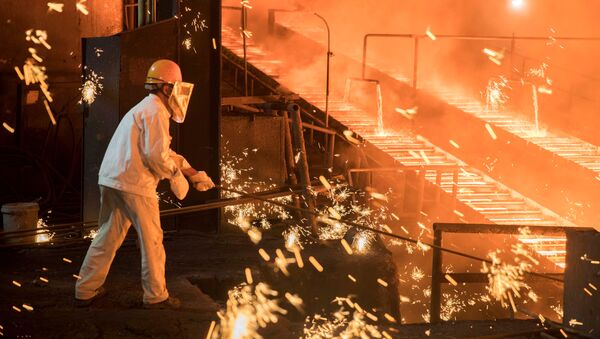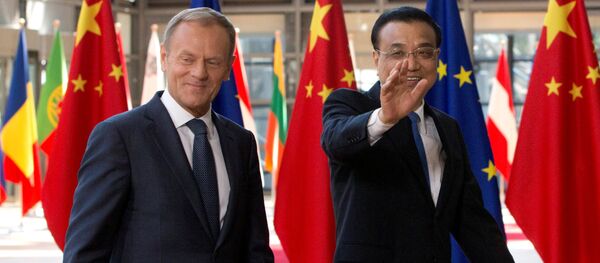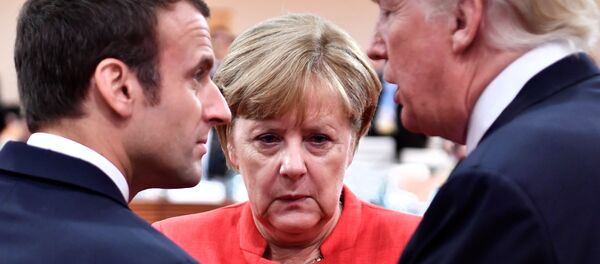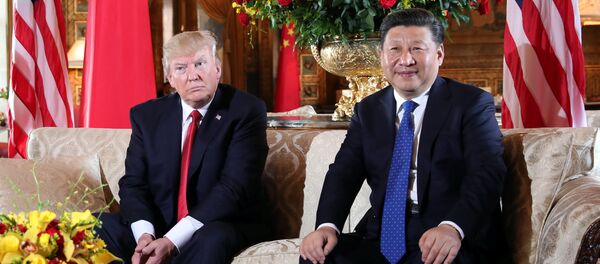China remains the world's leading steel producer, generating far more steel than any other country. Between 1990 and 2014, the country's output of steel increased 12-fold to 823 million metric tons.
#China #US #tradewar Limited China- US Trade War May Be Looming, @UBS Report Warns https://t.co/Dgk9HLzFbR pic.twitter.com/K2vf6YZpV1
— Yicai Global 第一财经 (@yicaichina) 25 июля 2017 г.
Now speculation is rife that the US Administration will not wait for G20 recommendations on resolving the global problem of excess steel capacity in order to introduce additional customs duties on steel imports, EURACTIV reported.
China Steel Production https://t.co/9Ee8Buu4YK pic.twitter.com/UetbaARR0d
— Muzaffaruddin Alvi (@Muzaffar69) 12 июня 2017 г.
In this case, it is China's steel production that is seen as the potential cause of Americans unleashing a global trade war which will also involve the EU.
EURACTIV recalled that "since 2000, Beijing has accelerated its steel production, raising its share of the world market from 15 percent to almost 50 percent, greatly supported by subsidies and other public measures."
Speaking to Sputnik, Russian expert Dmitry Tratas specifically pointed to "a rather difficult situation" in the world's steel market due to overproduction.
China Steel Mills Breaking Production Records as Trump Gets Set to Act https://t.co/3MDt6CFtMn #steel pic.twitter.com/f6FpS307if
— Alliance Steel (@AllianceSteel) 18 июля 2017 г.
"The surplus is quite systemic and it cannot be eliminated in the near future because none of the players want to leave this market," according to him.
"These declared or undeclared trade wars over steel have been in place in the past few years," Tratas said, adding that he does not rule out that another such war could be initiated by the US in the near future.
China steel production rose from 128 mtpa in 2000 to 810 mtpa in 2016, its share in global production from 15% to ~50% — World Steel Org. pic.twitter.com/syKvx4R8W2
— Salman Ebrahim, CFA (@salmanebrahim) 1 июня 2017 г.
"There is information that the Trump administration is drafting a law imposing restrictions on steel imports to the United States, something that will first of all affect China. Additionally, it may affect both Russia and Europe. From my point of view, such restrictions, or to be more exact, simply protectionism, violate the agreements and principles of the World Trade Organization (WTO)," he said.
He added that "if such restrictions are introduced, all interested parties will appeal to the WTO, but "it will be difficult to predict" how the issue will be settled.
Tratas described the attempts to hold China responsible for the global overabundance of steel production as biased and distorted.
"China has indeed significantly increased its output of steel in the past ten years, but this is something that is dictated by the needs of its economic growth, an imperative for each and every country in the world. As for the US, it has always stood for global competition and now Washington blames China for building up its own steel production – a stance that is out of line with logic," Tratas pointed out.
He was echoed by Wang Zhimin, head of the Center for the Study of Globalization and Modernization of China with the Institute of Foreign Economy and Trade, who said that accusations that China is allegedly provoking a global steel war hold no water.
"With the problem of overproduction really in place in China, this overproduction is relative. In China, the cost of labor is low and the export price for steel is relatively cheap – something which is not the case with Western countries is. In addition, China became a steel importer, up to the point that China's expenditures on steel imports have increased significantly as compared to its steel exports," Zhimin said.
In this regard, slashing steel production remains an important component of production capacity reduction, according to Zhimin. He recalled that last year, China reduced excess steel production by 65 million tons, while this year the figure is expected to stand at 45 million tons.
"This is why we can talk about China's great efforts to reduce steel production," Zhimin pointed out, noting that they had "achieved a great effect."





